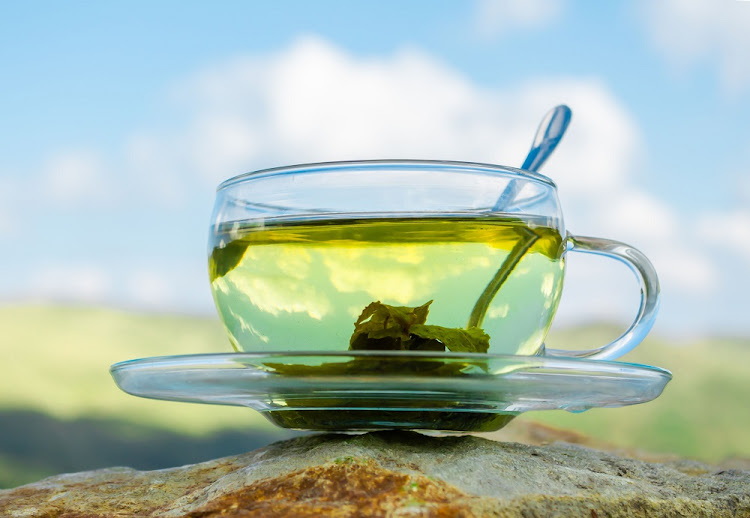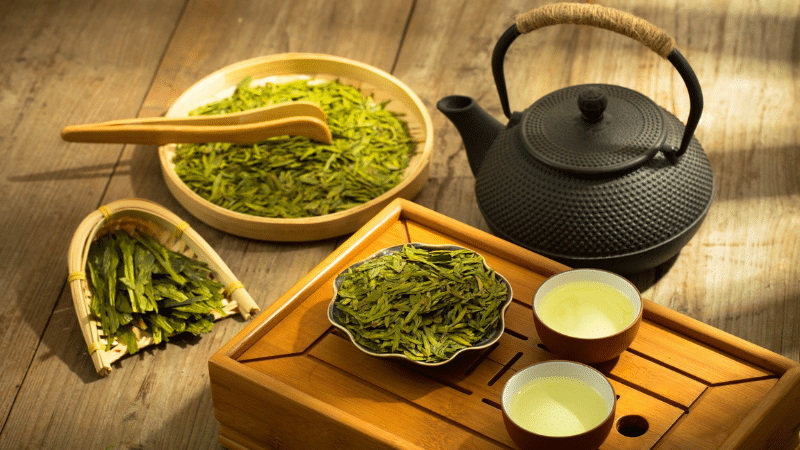Content Menu
● What is Green Tea Extract?
● Potential Benefits of Green Tea Extract
● Recommended Dosage
● Risks of Excessive Consumption
>> 1. Liver Damage
>> 2. Caffeine-Related Side Effects
>> 3. Iron Absorption Interference
>> 4. Interactions with Medications
● Factors Affecting Green Tea Extract Tolerance
>> Genetic Variations
>> Consumption on an Empty Stomach
>> Pre-existing Liver Conditions
● Safe Usage Guidelines
● Green Tea Extract in Weight Loss Products
● The Importance of Quality and Purity
● Alternatives to Green Tea Extract
● Conclusion
● FAQ
>> 1. How much green tea extract is too much?
>> 2. Can green tea extract cause liver damage?
>> 3. Is it safe to take green tea extract every day?
>> 4. Who should avoid taking green tea extract?
>> 5. Are there alternatives to green tea extract supplements?
● Citations:
Green tea extract has gained popularity as a dietary supplement due to its potential health benefits. However, like many supplements, it's possible to consume too much, leading to adverse effects. This article explores the potential risks of excessive green tea extract consumption and provides guidelines for safe usage.

What is Green Tea Extract?
Green tea extract is a concentrated form of green tea, containing high levels of polyphenols, particularly catechins. The most abundant and potent catechin in green tea is epigallocatechin-3-gallate (EGCG). These compounds are responsible for many of the health benefits associated with green tea consumption[3].
Potential Benefits of Green Tea Extract
Green tea extract has been associated with numerous health benefits, including:
1. Weight loss promotion
2. Blood sugar regulation
3. Disease prevention
4. Exercise recovery enhancement
5. Skin health improvement
6. Liver health support
7. Blood fat level reduction
8. Blood pressure regulation
9. Brain health improvement[6]
These benefits are primarily attributed to the high antioxidant content of green tea extract, particularly its catechins[3].
Recommended Dosage
The recommended dosage for green tea extract is typically between 250-500 mg per day. It's important to note that this should be taken with food to minimize the risk of adverse effects[6].
Risks of Excessive Consumption
While green tea extract can offer health benefits when consumed in moderation, taking too much can lead to several adverse effects:
1. Liver Damage
One of the most serious potential side effects of excessive green tea extract consumption is liver damage. Several studies and case reports have linked high doses of green tea extract to liver toxicity[1][2][5].
Symptoms of liver damage may include:
- Yellowing of the skin or eyes (jaundice)
- Stomach pain
- Dark urine
- Sweating
- Nausea
- Unusual tiredness
- Loss of appetite[5]
2. Caffeine-Related Side Effects
Green tea extract contains caffeine, which can cause side effects when consumed in large amounts. These may include:
- Anxiety
- Tremors
- Irritability
- Sleeping problems
- Headaches
- Irregular heartbeat[1][4]
3. Iron Absorption Interference
Green tea extract can interfere with iron absorption. This is particularly concerning for individuals with iron deficiency anemia[4].
4. Interactions with Medications
Green tea extract may interact with certain medications. For example, it can reduce the effectiveness of nadolol, a beta-blocker used for high blood pressure and heart problems[11].

Factors Affecting Green Tea Extract Tolerance
Several factors can influence an individual's tolerance to green tea extract:
Genetic Variations
Recent research suggests that certain genetic variations may predispose some individuals to liver damage from high-dose green tea extract. A study published in The Journal of Dietary Supplements identified two genetic variants that may predict this risk[14].
Consumption on an Empty Stomach
Taking green tea extract on an empty stomach increases its bioavailability and may be associated with increased adverse effects compared to taking it with food[7].
Pre-existing Liver Conditions
Individuals with pre-existing liver conditions may be at higher risk of experiencing liver damage from green tea extract[1].
Safe Usage Guidelines
To minimize the risk of adverse effects while potentially benefiting from green tea extract, consider the following guidelines:
1. Stick to the recommended dosage of 250-500 mg per day[6].
2. Always take green tea extract with food[6].
3. If you have a liver disorder, consult a healthcare professional before use[5].
4. Stop use and consult a healthcare professional if you develop symptoms of liver trouble[5].
5. Be cautious if you're sensitive to caffeine or taking other stimulants[2].
6. If you're taking medications, especially for high blood pressure or heart problems, consult your healthcare provider before using green tea extract[11].
Green Tea Extract in Weight Loss Products
Green tea extract is a common ingredient in many over-the-counter weight loss products. However, some of these products have been identified as the likely cause of rare cases of liver injury[11]. It's crucial to be cautious when using such products and to consult with a healthcare professional before starting any new supplement regimen.
The Importance of Quality and Purity
When choosing a green tea extract supplement, it's essential to select products that have been analyzed by an independent lab to verify purity and content. Look for supplements that specify their EGCG content, as this is the catechin most closely linked to the health benefits of green tea extract[6].
Alternatives to Green Tea Extract
For those concerned about the potential risks of green tea extract supplements, drinking green tea as a beverage can be a safer alternative. Most research suggests that drinking up to 8 cups of green tea daily is safe for most people[4]. However, even with the beverage form, it's important to be mindful of your caffeine intake and any potential interactions with medications.
Conclusion
While green tea extract offers numerous potential health benefits, it's crucial to use it responsibly. Excessive consumption can lead to serious side effects, particularly liver damage. By adhering to recommended dosages, taking the supplement with food, and being aware of your individual risk factors, you can minimize the potential for adverse effects. As with any supplement, it's always best to consult with a healthcare professional before adding green tea extract to your regimen, especially if you have pre-existing health conditions or are taking medications.

FAQ
1. How much green tea extract is too much?
Consuming more than 500 mg of green tea extract per day may increase the risk of adverse effects. The recommended dosage is typically between 250-500 mg per day[6].
2. Can green tea extract cause liver damage?
Yes, high doses of green tea extract have been associated with liver damage in some individuals. Symptoms of liver damage may include jaundice, stomach pain, dark urine, and unusual tiredness[1][2][5].
3. Is it safe to take green tea extract every day?
For most people, taking the recommended dose of green tea extract (250-500 mg) daily with food is considered safe. However, it's always best to consult with a healthcare professional before starting any new supplement regimen[6].
4. Who should avoid taking green tea extract?
Individuals with liver disorders, caffeine sensitivity, or those taking certain medications (especially for high blood pressure or heart problems) should consult a healthcare professional before taking green tea extract[1][2][11].
5. Are there alternatives to green tea extract supplements?
Yes, drinking green tea as a beverage can provide similar benefits with potentially lower risks. Most research suggests that drinking up to 8 cups of green tea daily is safe for most people[4].
Citations:
[1] https://www.urmc.rochester.edu/encyclopedia/content?contenttypeid=19&contentid=greenteaextract
[2] https://www.medicalnewstoday.com/articles/269538
[3] https://pmc.ncbi.nlm.nih.gov/articles/PMC2855614/
[4] https://www.webmd.com/vitamins/ai/ingredientmono-960/green-tea
[5] https://www.canada.ca/en/health-canada/services/drugs-health-products/medeffect-canada/safety-reviews/green-tea-extract-containing-natural-health-products-assessing-potential-risk-liver-injury.html
[6] https://www.healthline.com/nutrition/10-benefits-of-green-tea-extract
[7] https://www.vumc.org/poison-control/toxicology-question-week/march-12-2021-what-are-adverse-effects-green-tea-extract
[8] https://my.clevelandclinic.org/health/drugs/20553-green-tea-oral-dosage-forms
[9] https://www.healthline.com/nutrition/how-much-green-tea-per-day
[10] https://www.canada.ca/en/health-canada/services/food-nutrition/public-involvement-partnerships/notice-modification-list-permitted-supplemental-ingredients-permit-use-green-tea-extract-supplemental-ingredient-foods/document.html
[11] https://www.nccih.nih.gov/health/green-tea
[12] https://www.bannerhealth.com/newsroom/press-releases/green-tea-extract
[13] https://www.tga.gov.au/news/safety-alerts/camellia-sinensis-green-tea-extract
[14] https://www.rutgers.edu/news/green-tea-extract-may-harm-liver-people-certain-genetic-variations
[15] https://pmc.ncbi.nlm.nih.gov/articles/PMC3746392/






























